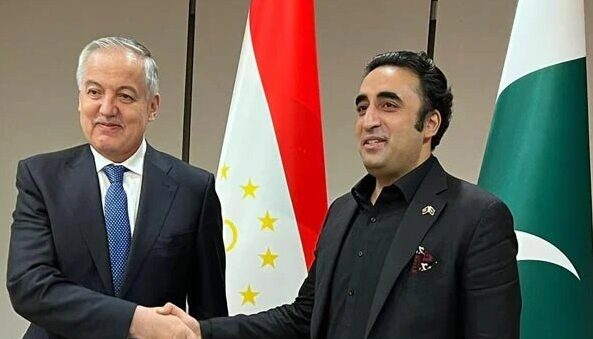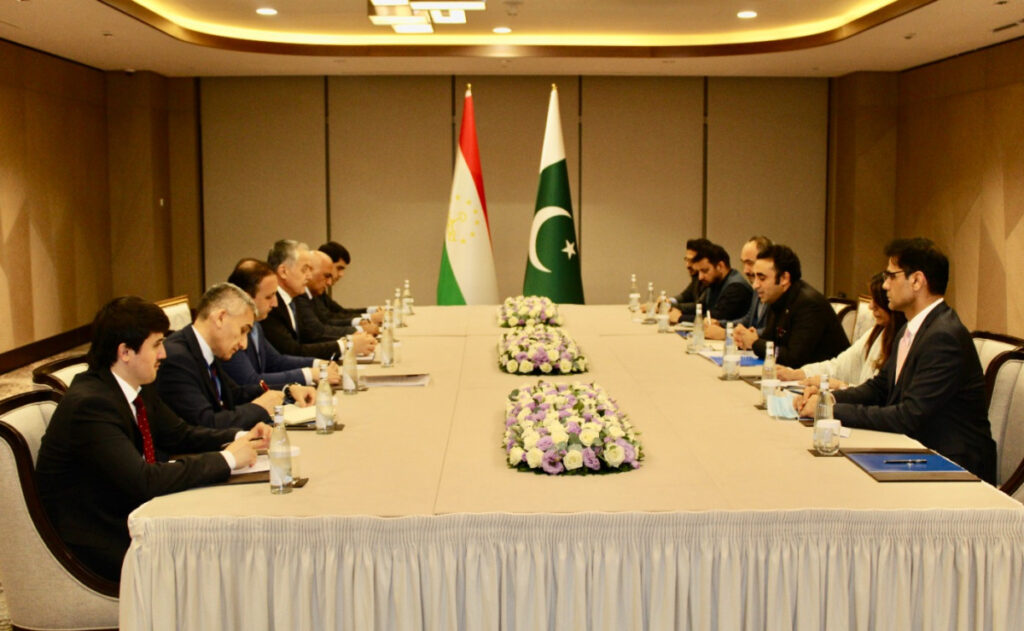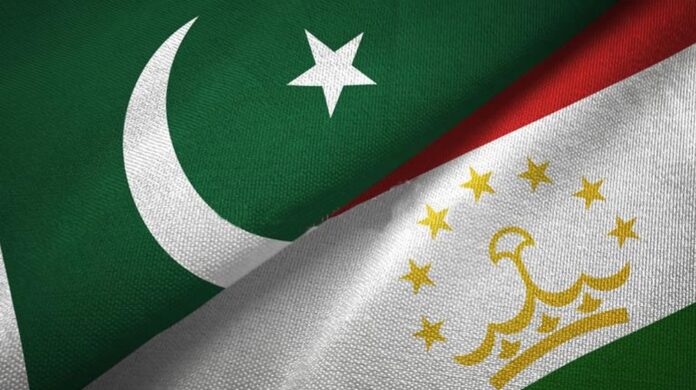Pakistan and Tajikistan have always enjoyed the benefits of their cooperative ties in multiple domains, and the governments of both states have developed various formats of collaboration in social, economic, and political dimensions. The geographical proximity between Pakistan and Tajikistan generally has let the two leaders consider each other as close neighbors. A short strip of Wakhan Corridor separates the territories of both countries from each other. However, the cooperative diplomatic values between Islamabad and Dushanbe do not consider the territorial distance a major hurdle between them. The formulation of bilateral cooperation between the two governments witnessed a history of thirty years of multidimensional collaboration in different fields, the patterns of which have been formalized through various agreements in the fields of security and defense, business and trade, energy and infrastructure, and culture and development. A persistent wave of pleasant people-to-people contacts fundamentally provided the main support to both governments for exploring various cooperative avenues. In this way, the genesis of cooperative bilateralism between Islamabad and Dushanbe is inherited in the common ideologies that have structured both nations’ societies on Islamic ideology. Initially, the government of Pakistan decided to establish its diplomatic ties with Tajikistan immediately after its independence in 1992. The continuation of cooperation in the subsequent years resulted in a brief series of formal interactions between the political and diplomatic authorities of both states. The completion of thirty years in 2022 has allowed the government authorities from Islamabad and Dushanbe to celebrate the successful completion of three decades of cooperative bilateralism, this has let the two-sided governments design future plans for their bilateral relations, which could help explore their untapped potential in different fields.
While attending the celebrations in Pakistan, the diplomatic community of Tajikistan communicated its ambitions for enhancing the existing vision of the Islamabad-Dushanbe friendship. In May 2022, the Ambassador of Tajikistan attended a public seminar at a Lahore-based university and highlighted the constructive engagement between leading state authorities of both states in the areas of education, research, and business. While accepting a moderate growth of relations in these areas, Ambassador Ismatullo Nasredin publicly mentioned the need for exploring more avenues of people-to-people connections between Pakistan and Tajikistan.
Tajikistan’s diplomatic mission accepts that the objective of multiplying the existing models of societal connections between both states is highly dependent on the active role of people from trading and academic communities. It will allow the business communities to increase their communication for increasing the existing volumes of trade in several unexplored areas. The vision of trading communities will uncover additional business platforms, and the active role of academia will help define the future paths of political and diplomatic communications between Islamabad and Dushanbe. The diplomatic representatives of the Tajikistan government in Pakistan believe that enhancing cooperation will bring positive results for both. It is also accepted by both states that increasing public support for their bilateral connection is only possible with the active role of people-to-people contacts at the societal level. In response to the supportive positions of the Tajik state officials, the government of Pakistan has also designed reciprocal steps. It conveyed Islamabad’s high ambitions for extending mutual ties with Dushanbe. A recent meeting of the Foreign Affairs Ministers of both states was held in July 2022, in which the representatives discussed potential areas (such as economy, trade, diplomacy, and politics) of their bilateral cooperation. In this way, the combination of diplomatic and political communications is considered to be the main force keeping the governments of both states in a closer partnership. Based on a brief overview of the pleasant bilateral history of Pakistan-Tajikistan cooperation in diverse directions, it can easily be maintained that the development of strong political communication between the formal state authorities mainly supported the economic and social relations at the bilateral level. Analogous to the contemporary round of two-sided meetings of state officials, the history of economically collaborative, diplomatically supportive, and socially pleasant values witnessed multileveled cooperation between Islamabad and Dushanbe, which could be measured on the following lines.

Cooperative ties between the governments of Pakistan and Tajikistan were established in 1992 when the Tajik nation secured an independence status, and Islamabad decided to inaugurate its diplomatic relations with Dushanbe based on mutual respect and common ideological grounds. The same religious and cultural features inherited in the concept of Muslim brotherhood were recognized as the founding principles of bilateral cooperation between Islamabad and Dushanbe. The principles supported the multidimensional interaction between both states in the subsequent years of Tajikistan’s independence. After initiating formal diplomatic services through opening embassies in each other’s territories, the governments of both states decided to widen the scope of their collaborations in different fields. Establishing formal diplomatic connections laid the foundations of Islamabad-Dushanbe diplomatic services, and facilitated the state representatives from both sides to support their mutual collaboration in diverse fields. The initial round of agreements outlined the areas of their mutual efforts by signing various agreements and different Memorandums of Understanding (MoUs). Gradually, an appreciable growth of their diplomatic communications and political coordination assisted in understanding the positions of each other in their respective regions (South Asia and Central Asia). Thus, a brief layer of reciprocal visits of high-ranked state officials prevailed in the bilateral ties between Pakistan and Tajikistan and structured their progressing friendship in diverse directions.
To comprehend the history of the joint collaboration between Islamabad and Dushanbe, the Ministry of Foreign Affairs (MOFA) of Pakistan developed an online list of sixty-four different joint ventures concluded between the governments of Pakistan and Tajikistan at the bilateral level. From June 6, 1992, to July 2, 2019, the different agreements, MoUs, protocols, and declarations covered the social, political, and economic dimensions of broader Pakistan-Tajikistan relations. The continuation of bilateral cooperation recently resulted in another brief round of agreements when the leaders of both nations signed certain MoUs intending to keep the journey of bilateral cooperation active between their nations. This meeting was held in Islamabad when Tajik President Emomali Rahmon paid a two-day visit to Pakistan in June 2021.The main focus of these MoUs is on providing new avenues to their respective nations in the fields of culture, development, tourism, education, and investment. The academic dimensions of these MoUs established the initial collaboration between the Tajik Technical University, named after academician MS Osimi and the Indus University of Pakistan, the Tajik Institute of Languages, Dushanbe Tajikistan, the National University of Modern Languages of Pakistan, and Technological University of Tajikistan and Comsats University Islamabad. Additionally, the aim of increasing trade and investment developed active connections between the Chamber of Commerce and Industry of the Republic of Tajikistan and the Quetta Chamber of Commerce and Industry, Chamber of Commerce and Industry of the Republic of Tajikistan and the Sialkot Chamber of Commerce and Industry, and the Lahore Chamber of Commerce and Industry and the Chamber of Commerce and Industry of Tajikistan. The government authorities from both sides concluded some agreements of mutual collaboration between their foreign ministers, parallel to connecting the Agency for State Financial Control and Struggle against Corruption of the Republic of Tajikistan and the National Accountability Bureau of the Islamic Republic of Pakistan with each other. In the areas of development, the two-sided state authorities signed cooperation in the fields of Prevention and Liquidation of Emergency Situations and Art and Culture. The most interesting factor in the recent developments of the Islamabad-Dushanbe friendship is the signing of a Joint Declaration on the Next Steps in Building Strategic Partnership for Regional Solidarity and Integration. This strategic agreement is supported by the Joint Declaration on the Strengthening the Road to Strategic Partnership for Regional Integration in 2018 and the Road to Strategic Partnership for Regional Solidarity signed in 2017. Both joint declarations highlighted the greater values of peace, progress, and prosperity between the two nations.

On the question of Afghanistan, the Tajik government has always appreciated the role of Islamabad in arranging different state-level meetings for resolving the Afghan issue peacefully. The quest to support the peaceful resolution of the Afghan issue became another point of cooperation between Islamabad and Dushanbe. The formal Ambassador of Tajikistan to Pakistan, Ismatullo Nasredin mentioned the significance of the Afghanistan issue for Dushanbe in the regional politics of Central Asia while recognizing its attachment to South Asian politics. In this way, a shared vision of peace and stability in Afghanistan has proved to be a strong base of Pakistan-Tajikistan friendship, in which the two governments understand the politics of each other’s regions.
While arranging different celebrations of their thirty-years-friendship, the state authorities of both states have accepted the need to explore further areas of mutual collaboration, which could let the Tajik and Pakistani governments multiply the existing patterns of their cooperation in several untapped directions. While using their potential under the auspices of various multilateral frameworks of the international community, leaders of both states have acknowledged the potential of each other at various multistate platforms and agreed to use the platforms of UN, SCO, ECO, OIC, and CICA for the improvement of their conventional patterns of cooperation beyond the bilateral level. In addition to these multistate initiatives of the international community, the active positions of Islamabad and Dushanbe in various other multistate forums could also help support each other’s positions in their respective regions. In this way, the future of Pakistan and Tajikistan could facilitate the two governments in improving their standing in regional and extra-regional affairs with the help of a broader bilateral vision of diplomatic support and political coordination. The most important dimension in this regard is the potential security challenges of Islamabad and Dushanbe in their domestic regions, South Asia and Central Asia. The state authorities of both states are required to rationally understand their security issues which could be managed with the support of their effective diplomatic and political communication beyond the existing features of cooperative bilateralism. It will also help both states to craft a more cooperative future for their nations based on a greater vision of regional connectivity and mutual trust.





